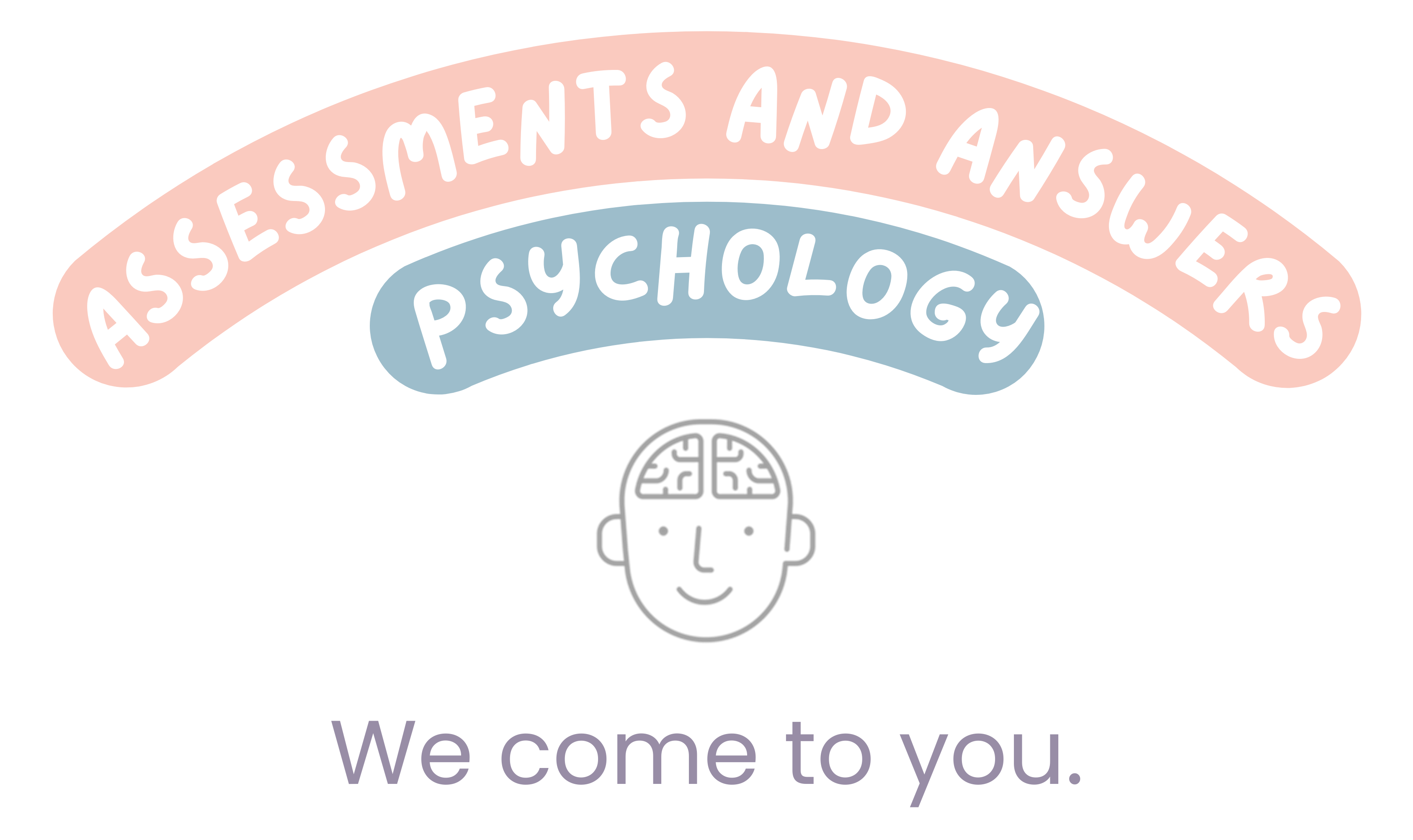Mobile ADHD Assessment for Children
Serving Brisbane, Logan, Gold Coast, and Sunshine Coast
Attention-Deficit/Hyperactivity Disorder (ADHD) is a neurodevelopmental condition that can present in three ways: predominantly inattentive, predominantly hyperactive/impulsive, or as a combined presentation of both. ADHD assessment helps clarify an individual’s specific presentation and provides tailored recommendations, resources, and support to address their unique needs effectively.
Understanding ADHD Assessment

“How do I know if my child needs an ADHD assessment?”
ADHD can manifest in various ways, so it’s understandable to question whether an assessment is needed. Here are some common signs that may suggest an ADHD assessment could help:
- Difficulty maintaining attention
- Hyperactivity (excess movement considered inappropriate to the setting)
- Poor impulse control
- Novelty seeking
- Poor time management
- Relationship and social challenges
- Poor regulation of emotion
- Symptoms often interfere with or reduce the quality of academic performance
“Why does my child need an ADHD assessment?”
Many children may experience challenges such as sitting still, waiting their turn, paying attention, or acting impulsively. For children with ADHD, these behaviors extend beyond typical difficulties, significantly impacting social relationships, academic performance, and daily life. Without proper support, ADHD can contribute to difficulties such as low self-esteem, increased anxiety, depression, and heightened frustration or anger.
An ADHD assessment is a crucial step for families seeking clarity and support. A diagnosis not only provides important insights but also unlocks access to effective treatments and targeted support. Early interventions have been shown to dramatically improve behaviour, social skills, and academic achievement, empowering children with ADHD to reach their full potential.
Our comprehensive ADHD assessment evaluates developmental, behavioural, social, and academic functioning to determine whether your child meets the criteria for an ADHD diagnosis. Following the assessment, you will receive a detailed report and a parent/carer feedback session, offering tailored recommendations and strategies for support. If necessary, referrals to other healthcare professionals will be provided to ensure your family receives comprehensive care.
Getting Started: The Intake Process
Intake Session
- A 30-60 minute intake session is available for families uncertain about the most suitable assessment process.
- During this session, the psychologist will work with the parent/guardian to explore your child’s developmental history, relevant family background, and presenting challenges. Rating scales may also be completed to determine the most appropriate assessment and to schedule future appointments.
Inclusions and Timeline
- The Conner’s Comprehensive Behaviour Assessment (CCBA) will be provided to the child’s teacher and parent for completion through an online questionnaire.
- Once completed, the psychologist will evaluate the CCBA results to determine the most suitable assessment for the child.
- A follow-up appointment with the parent or caregiver will be conducted via phone or video call to discuss the CCBA findings, complete additional rating scales, and outline the next steps in the assessment process.
Comprehensive ADHD Assessment Process
"What’s included as part of the assessment?”
No referral from a general practitioner is required for an ADHD assessment. The process involves several components, including:
1. Clinical Interview and History Gathering
The psychologist will conduct a clinical interview with the parent or caregiver to collect information about the child’s family and medical history, developmental milestones, and academic performance.
2. Rating Scales
The psychologist will request your child (depending on age), parent/caregiver, and child’s teacher (if applicable) to complete questionnaires assessing characteristics of learning impairment and functioning.
3. Standardised Assessment
The psychologist will use standardised cognitive and academic assessment tools to determine current learning abilities.
4. Developmental and Cognitive Testing
The psychologist will assess your child’s cognitive abilities, language skills, academic performance, adaptive functioning, and executive functioning using recognised assessment tools to gain a better understanding of their current cognitive and academic functioning.
5. Report and Recommendations
As part of the assessment, you will receive a comprehensive report along with recommendations. Please note that reports typically have a turnaround time of 4–6 weeks. The findings will be discussed with parents or caregivers during the feedback session.
Inclusions and Timeline
Our ADHD assessment process includes three sessions, each designed to thoroughly evaluate your child’s abilities and provide actionable insights.
Session 1: Cognitive Assessment (WISC-V) – up to 2 hours
In this session, our psychologist will assess your child’s cognitive abilities, language skills, academic function, adaptive functioning, and executive functioning using the Wechsler Intelligence Scale for Children, Fifth Edition (WISC-V). This will provide valuable insights into your child’s current functional and social capabilities. The findings from the WISC-V will inform the diagnosis, helping to assign the appropriate specifiers to better understand the child’s unique needs.
Session 2: Attention Assessment (TEA-Ch2) – up to 1 hour
The Test of Everyday Attention for Children, Second Edition (TEA-Ch2), measures various aspects of attention in children aged 5 to 15. In this session, the psychologist will use a combination of paper-based and digital tests that evaluate key areas of attention: selective, sustained, and switching. This helps explain why a child may experience difficulties with everyday tasks and activities, providing insight into their attention challenges.
Session 3: Feedback and Recommendations – up to 1 hour
The feedback session will be scheduled 4-6 weeks after the final assessment. This session can be conducted via phone or video call for your convenience. During this session, the psychologist will provide parents or caregivers with a comprehensive report and discuss the findings in detail. Recommendations will be made based on the results, and any referrals to other healthcare professionals will be discussed when appropriate.
Important Notes
- This assessment does not guarantee a diagnosis of ADHD. The results should be reviewed with your child’s paediatrician or psychiatrist for a full interpretation and to explore any further treatment or referrals.
- ADHD assessments are currently only available for children aged 6 to 15 years.
Fee Schedule and Duration
Our assessment fees are based on clinical time, charged at an hourly rate of $250.00. The total clinical time may vary depending on individual client needs, which we will discuss with families during the intake process. Additionally, a fee of $120 for assessment materials is included in all cost estimates.
Mobile ADHD Assessment Fee Estimate: $2,120
(Based on 8 hours of clinical time and assessment materials)
Important Notes:
- Deposit: A non-refundable deposit of $500.00 is required at the time of booking.
- Final Invoice: An invoice will be issued following the completion of each assessment component.
- Payment: Full payment must be received prior to the feedback session.
- Medicare Coverage: Assessments are not covered by Medicare.
- Private Health Insurance: Some psychological services may qualify for rebates. Contact your insurer to confirm eligibility.
- NDIS Funding: Diagnostic assessments are not funded by the NDIS unless specifically requested by the National Disability Insurance Agency (NDIA). Cognitive assessments may be covered under certain circumstances; please consult your local area coordinator for details.
- Medicare Rebates for Referrals:
- When referred by a paediatrician or psychiatrist, up to four hours of diagnostic assessment may be eligible for a rebate of $93.35 per hour.
- This rebate applies only to standardised assessments and developmental/cognitive testing.
